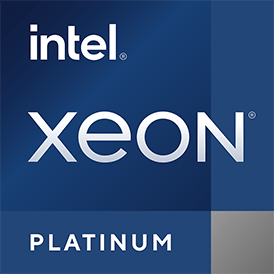
AMD EPYC 7F72 vs Intel Xeon Platinum 8268
Last updated:
CPU comparison with benchmarks

|
 |

|
| AMD EPYC 7F72 | Intel Xeon Platinum 8268 | |
CPU comparisonIn this CPU comparison, we compare the AMD EPYC 7F72 and the Intel Xeon Platinum 8268 and use benchmarks to check which processor is faster.
We compare the AMD EPYC 7F72 24 core processor released in Q2/2020 with the Intel Xeon Platinum 8268 which has 24 CPU cores and was introduced in Q2/2019. |
||
| AMD EPYC (129) | Family | Intel Xeon Platinum (89) |
| AMD EPYC 7002 (24) | CPU group | Intel Xeon Platinum 8200/9200 (21) |
| 2 | Generation | 2 |
| Rome (Zen 2) | Architecture | Cascade Lake |
| Desktop / Server | Segment | Desktop / Server |
| -- | Predecessor | -- |
| -- | Successor | -- |
|
|
||
CPU Cores and Base FrequencyThe AMD EPYC 7F72 is a 24 core processor with a clock frequency of 3.20 GHz (3.70 GHz). The processor can compute 48 threads at the same time. The Intel Xeon Platinum 8268 clocks with 2.90 GHz (3.90 GHz), has 24 CPU cores and can calculate 48 threads in parallel. |
||
| AMD EPYC 7F72 | Characteristic | Intel Xeon Platinum 8268 |
| 24 | Cores | 24 |
| 48 | Threads | 48 |
| normal | Core architecture | normal |
| Yes | Hyperthreading | Yes |
| No | Overclocking ? | No |
| 3.20 GHz | Frequency | 2.90 GHz |
| 3.70 GHz | Turbo Frequency (1 Core) | 3.90 GHz |
| 3.50 GHz | Turbo Frequency (All Cores) | 3.40 GHz |
Memory & PCIeUp to GB of memory in a maximum of 8 memory channels is supported by the AMD EPYC 7F72, while the Intel Xeon Platinum 8268 supports a maximum of 1024 GB of memory with a maximum memory bandwidth of 140.7 GB/s enabled. |
||
| AMD EPYC 7F72 | Characteristic | Intel Xeon Platinum 8268 |
| DDR4-3200 | Memory | DDR4-2933 |
| Max. Memory | 1024 GB | |
| 8 (Octa Channel) | Memory channels | 6 (Hexa Channel) |
| 51.2 GB/s | Max. Bandwidth | 140.7 GB/s |
| Yes | ECC | Yes |
| -- | L2 Cache | -- |
| 192.00 MB | L3 Cache | 35.75 MB |
| 4.0 | PCIe version | 3.0 |
| 128 | PCIe lanes | 48 |
| 252.0 GB/s | PCIe Bandwidth | 47.3 GB/s |
Thermal ManagementThe AMD EPYC 7F72 has a TDP of 240 W. The TDP of the Intel Xeon Platinum 8268 is 205 W. System integrators use the TDP of the processor as a guide when dimensioning the cooling solution. |
||
| AMD EPYC 7F72 | Characteristic | Intel Xeon Platinum 8268 |
| 240 W | TDP (PL1 / PBP) | 205 W |
| -- | TDP (PL2) | -- |
| -- | TDP up | -- |
| -- | TDP down | -- |
| -- | Tjunction max. | -- |
Technical detailsThe AMD EPYC 7F72 has 192.00 MB cache and is manufactured in 7 nm. The cache of Intel Xeon Platinum 8268 is at 35.75 MB. The processor is manufactured in 14 nm. |
||
| AMD EPYC 7F72 | Characteristic | Intel Xeon Platinum 8268 |
| 7 nm | Technology | 14 nm |
| Chiplet | Chip design | Monolithic |
| x86-64 (64 bit) | Instruction set (ISA) | x86-64 (64 bit) |
| SSE4a, SSE4.1, SSE4.2, AVX2, FMA3 | ISA extensions | SSE4.1, SSE4.2, AVX2, AVX-512 |
| SP3 | Socket | LGA 3647 |
| AMD-V, SVM | Virtualization | VT-x, VT-x EPT, VT-d |
| Yes | AES-NI | Yes |
| Windows 10, Linux | Operating systems | Windows 10, Linux |
| Q2/2020 | Release date | Q2/2019 |
| 2450 $ | Release price | 6302 $ |
| show more data | show more data | |
Rate these processors
Average performance in benchmarks
⌀ Single core performance in 2 CPU benchmarks
⌀ Multi core performance in 0 CPU benchmarks
Geekbench 5, 64bit (Single-Core)
Geekbench 5 is a cross plattform benchmark that heavily uses the systems memory. A fast memory will push the result a lot. The single-core test only uses one CPU core, the amount of cores or hyperthreading ability doesn't count.
|
|
AMD EPYC 7F72
24C 48T @ 3.70 GHz |
||
|
|
Intel Xeon Platinum 8268
24C 48T @ 3.90 GHz |
||
Cinebench R20 (Single-Core)
Cinebench R20 is the successor of Cinebench R15 and is also based on the Cinema 4 Suite. Cinema 4 is a worldwide used software to create 3D forms. The single-core test only uses one CPU core, the amount of cores or hyperthreading ability doesn't count.
|
|
AMD EPYC 7F72
24C 48T @ 3.70 GHz |
||
|
|
Intel Xeon Platinum 8268
24C 48T @ 3.90 GHz |
||
Geekbench 5, 64bit (Multi-Core)
Geekbench 5 is a cross plattform benchmark that heavily uses the systems memory. A fast memory will push the result a lot. The multi-core test involves all CPU cores and taks a big advantage of hyperthreading.
|
|
AMD EPYC 7F72
24C 48T @ 3.50 GHz |
||
|
|
Intel Xeon Platinum 8268
24C 48T @ 3.40 GHz |
||
Geekbench 6 (Single-Core)
Geekbench 6 is a benchmark for modern computers, notebooks and smartphones. What is new is an optimized utilization of newer CPU architectures, e.g. based on the big.LITTLE concept and combining CPU cores of different sizes. The single-core benchmark only evaluates the performance of the fastest CPU core, the number of CPU cores in a processor is irrelevant here.
|
|
AMD EPYC 7F72
24C 48T @ 3.70 GHz |
||
|
|
Intel Xeon Platinum 8268
24C 48T @ 3.90 GHz |
||
Geekbench 6 (Multi-Core)
Geekbench 6 is a benchmark for modern computers, notebooks and smartphones. What is new is an optimized utilization of newer CPU architectures, e.g. based on the big.LITTLE concept and combining CPU cores of different sizes. The multi-core benchmark evaluates the performance of all of the processor's CPU cores. Virtual thread improvements such as AMD SMT or Intel's Hyper-Threading have a positive impact on the benchmark result.
|
|
AMD EPYC 7F72
24C 48T @ 3.50 GHz |
||
|
|
Intel Xeon Platinum 8268
24C 48T @ 3.40 GHz |
||
Estimated results for PassMark CPU Mark
Some of the CPUs listed below have been benchmarked by CPU-monkey. However the majority of CPUs have not been tested and the results have been estimated by a CPU-monkey’s secret proprietary formula. As such they do not accurately reflect the actual Passmark CPU mark values and are not endorsed by PassMark Software Pty Ltd.
|
|
AMD EPYC 7F72
24C 48T @ 3.50 GHz |
||
|
|
Intel Xeon Platinum 8268
24C 48T @ 3.40 GHz |
||
Devices using this processor |
|
| AMD EPYC 7F72 | Intel Xeon Platinum 8268 |
| Unknown | Unknown |
Popular comparisons containing this CPUs
back to index









